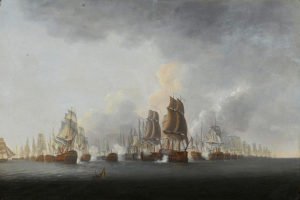Henry Savage
c1737-1823.
Savage was commissioned lieutenant on 20 July 1758 and served aboard the Achilles 60, Captain Hon. John Luttrell during 1766-7.
By 1777 he was the first lieutenant of the Ardent 64, Captain Lord Mulgrave, serving in home waters during the summer and often assuming command of the ship in the absence ashore of his captain on political business.
His first command, the sloop Rover 16, was captured by the French frigate Junon 32 in the West Indies on 13 September 1780 after being dismasted and holed, but not suffering any casualties. Scandalously Savage was robbed of his purse by the French commander, yet the Rover did not remain long in the enemy service, being recaptured by a privateer in February 1781. After being exchanged following much correspondence between Admiral Rodney and the Marquis de Bouille Savage was posted captain on 31 January 1781, and he commanded the Boreas 28 in the Leeward Islands that summer before returning home at the end of the year.

Savage’s naturally aggressive tendencies were shown to great effect at the Battle of the Saintes in 1782.
Upon joining the Hercules 74 in December 1781 Savage went out once more to the Leeward Islands in January 1782, and he fought at the Battle of the Saintes on 12 April. Although suffering from gout he refused to take up his normal chair on the quarterdeck, but instead added his own personal venom through his speaking trumpet at the hammock nettings, balling his fist at each Frenchman as they came abreast of his ship. After being wounded and taken below decks he was soon back at his post, but this time on his chair, to continue the tirade of insults and abuse. His ship suffered casualties of six men killed and nineteen wounded during the battle, and when he was afterwards hospitalised his first lieutenant, William Nowell, refitted the Hercules at Jamaica.
Savage commanded the Pomona 28 from the summer of 1789 through the Spanish Armament of 1790 until the end of the Russian armament in October 1791.
In March 1794 he recommissioned the floating battery Albion 74, serving in the North Sea, and he presided over the court martial into the loss of the Reunion 36, Captain William Bayntun, on 7 December 1796. Under his command the Albion was herself wrecked in the Swin on 27 April 1797 having been positioned off Foulness to protect the River Thames, but then been driven ashore in a gale. The crew were rescued by the Astrea 32 Captain Richard Dacres, and the loss was attributed to the failure of the pilots who were ordered never to be employed again. His men were thereafter reassigned to the Lancaster 64 fitting out at Deptford, which ship almost immediately joined the Nore mutiny which broke out on 12 May.
Savage joined the Warrior 74 shortly afterwards, going out to the Mediterranean before leaving in the spring of 1799 after learning of his elevation to flag rank on 14 February.
He became a vice-admiral on 9 November 1805, was nominated for a role in Vice-Admiral Lord Nelson s funeral on 9 January 1806 but was unable to attend through illness, and was promoted admiral on 31 July 1810.
Savage died in 1823.
His address in his will was given as Westminster. He married Christine Plaistow at Westminster in 1766 and the couple had issue three sons. His wife died on 16 March 1810.
